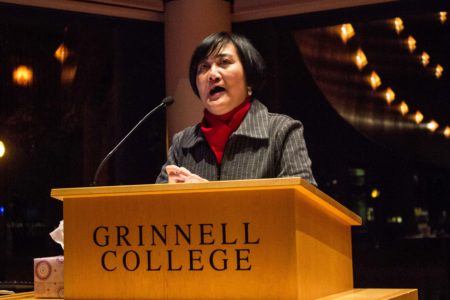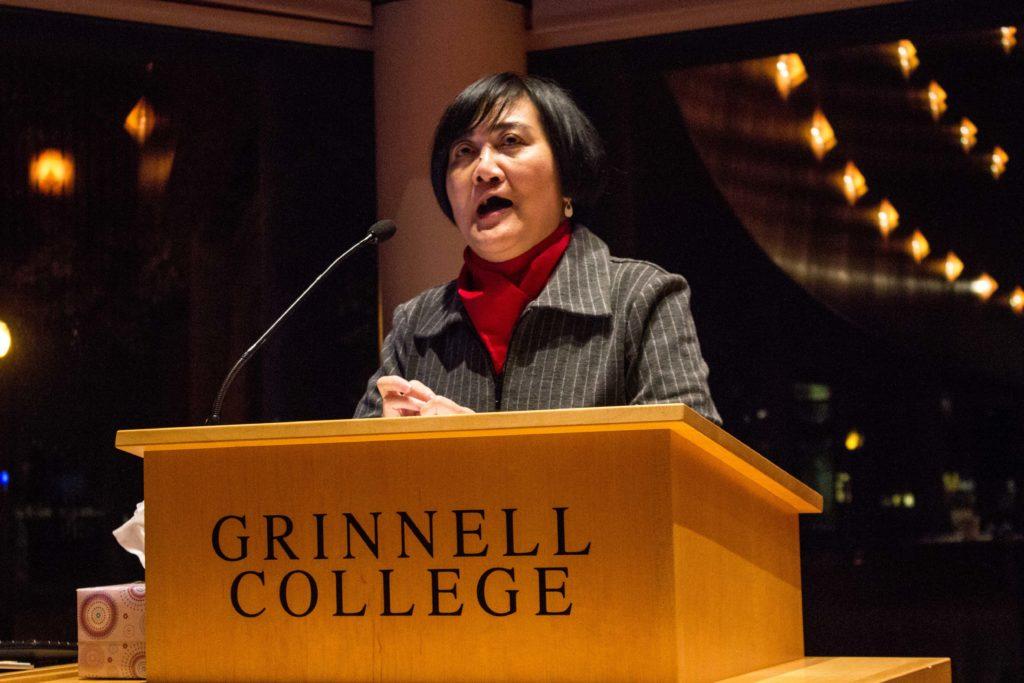By Candace Mettle
mettleca@grinnell.edu
Postcolonial theorist Rey Chow presented the Connelly Lecture on Friday, Oct. 14. Named after late Grinnell English professor Peter Connelly, the annual lecture offers insight into the work of distinguished scholars. Chow presented her work “Foucault, Race and Racism,” which will be published in “After Foucault” by Cambridge University Press.
“We live in a time of when race and racism are unavoidable topics,” Chow said. “We have currently some very good ways and some very powerful ways of addressing racism. Foucault offers a very unique entry into these problems. He may not give you exactly the answers that we expect right away, but if you follow his path of thinking and his path of research, I think we will arrive at a very interesting understanding of race as a problem in modern western society and how that then gets circulated around the world.”
To justify her argument, Chow referenced Foucault’s famous concepts “biopower, biohistory and biopolitics,” while applying the works of other philosophers such as Fanon and Said.
The lecture was broken up into four distinctive parts: “Discourse and its Postcolonial Inflection,” “Race-Studies’ Repressive Hypothesis,” “Entry of Life into History” and “The Aftereffects of Pastoral Power,” or “How Society Must Be Defended.”
“Discourse and its postcolonial inflection” speaks on the definition, made by the victors of postcolonialism, of race as skin color and racism as the process of oppression. The second section, “Race-Studies’ Repressive Hypothesis,” refers to the works of Fanon in his exploration of the tensions that racism brings to the individual and society. Consequently, the tensions involved lead to the normalization of race and racism by the state, which leads into the “Entry of Life into History.” Finally, the fourth section credits the nature of Christianity as a religion based on universally spreading the gospel to anyone, allowing the state to manage populations.
Chow stresses in her lecture that the tendency to create race is neither a positive nor negative effect. What matters is what the state and groups choose to do when mobilizing race.
“The state functions in such a way that it does not simply repress the different groups of people [when] coming forward,” Chow said. “[The state] actually encourages and allows and sometimes facilitates the emergence of identity politics.”
As a result, identity politics allow populations to rally their cause and change the landscape of how the state regards race.

“Identity politics should be seen as a part of the history of this country,” Chow continued. “[When] you think of the state management of population in, for example, the context of the U.S., we had the civil rights movement if you think of that as at least of one origin for the one emergence of identity politics as we have it now, then identity politics is a part of a history. [Different group of people] come forward and demand that their rights be respected and honored.”
Although descriptive terms such as African American and Asian American are examples of how the state controls populations, Chow believes that they can be used to effectively challenge the state. The work of movements like Black Lives Matter help citizens understand the implications of race, the state and what it means to refer to oneself as “I.”
“I don’t think as individuals we should think of ourselves as completely outside the collective. … we are always a part of a population, a part of a collective.”
To continue this dialogue, Chow suggests that students take advantage of the opportunities that the College provides through its Humanities department and extensive libraries.
“[Grinnell students] are very lucky to be here — I would like to be one of them,” Chow said. “I would like to get all this attention from my professors. They are doing well and they should continue to be obsessed with interesting ideas. It’s a very formative time of your lives.”


































































